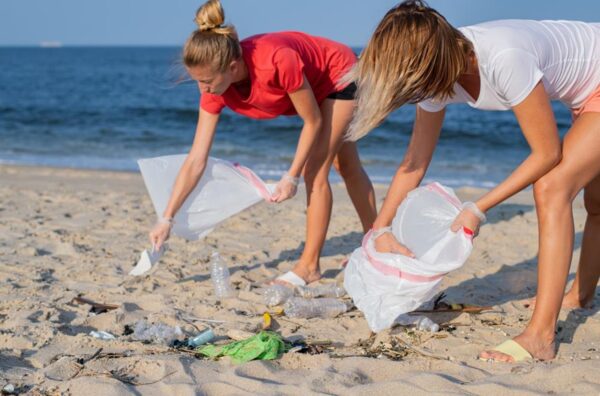A recently released report titled “Legacy Plastics” suggests that community driven beach cleanups could be a more cost-effective strategy to removing large, macroplastics compared to trials testing novel technologies. However, preventing plastics from entering the environment must be a policy priority.
The report, released by the Royal Society at the same time as the latest United Nations Plastics Treaty negotiations, summarises some of the technologies and other interventions that are available to clean-up legacy plastics from the environment, as well as discussing their feasibility, effectiveness and environmental impacts.
Key Findings
The report has 5 key findings:
- To tackle plastic pollution and its negative consequences prevention is, and should remain, the priority.Over-emphasis on clean-up interventions could divert attention away from more systemic solutions focused on minimising plastic use, including investing in more benign and sustainable alternatives, and efforts to move to a circular plastic economy through effective reuse and recycling.
- Some amount of legacy plastic removal may be beneficial, particularly in environments that have high natural capital and/or social value,and where the risks associated with clean-up activities are shown to be lower than the risks associated with leaving plastic in the environment.
- Priority areas for clean-up in the environment can be identified according to:
- The natural and social capital value of the area
- The potential hazards that the plastic pollution poses in this area
- The feasibility and likely effectiveness of clean-up
- The risk of negative consequences from clean-up
- Based on the range of options currently available, those that involve hand-picking litter from shorelines and/or intervene close to the source of plastic pollutionare likely to be the most effective.
- The environmental impacts and cost effectiveness of clean-up technologies remain largely unknown. To address this gap, efficacy and environmental impact assessments are required in the locations where the technology is to be deployed.
It is expected the concentration of environmental plastics could triple by 2060 if current trends continue.
Furthermore, the report busts some common statements about marine plastic, including “the assumption that plastic accumulates in large floating islands on the surface of the ocean, like the Great Pacific Garbage Patch. However, in reality, only 2% of all marine plastic is floating offshore on the surface of the ocean. Most plastic (88%) remains close to the shoreline and is also broadly dispersed within the water column, on the seabed and buried in sediment.”
It is suggested that the overall effectiveness of clean-up interventions in reducing the mass of plastic in the environment is questionable given that a substantial proportion of this debris is microplastic due to their wide distribution making it almost impossible to remove with current technologies.
The full report from the Royal Society can be read here: Legacy plastics: technologies and interventions to remove existing plastic from aquatic environment
